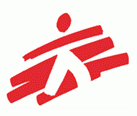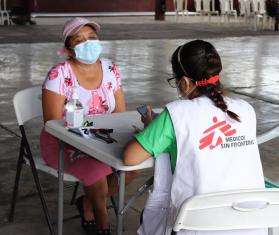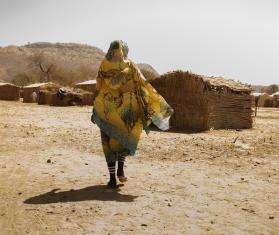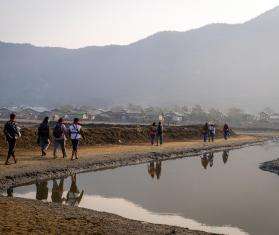In 2014, the largest Ebola outbreak in history struck West Africa, the number of displaced people in the world exceeded 50 million, and the war in Syria entered its fourth year.
Doctors Without Borders/Médecins Sans Frontières (MSF) deployed teams to work in simultaneous emergency situations across the globe, from Liberia to South Sudan, from Ukraine to Iraq. The common thread this year was one of abandonment: the sheer number of Ebola sufferers meant that at the height of the epidemic, many were left to die on their own, stripped of their dignity; in conflict zones the elderly, people with disabilities, and the sick were often unable to escape to safety; and as high-income countries turned their attention ever inward, people in desperate need found themselves largely forgotten.
Fighting Ebola in West Africa
When the Ebola outbreak was officially declared on March 22 2014 in Guinea, no one could have foreseen the extent of the suffering that would ensue. By the end of the year, the disease had claimed almost 8,000 lives in West Africa, including those of 13 MSF employees.
MSF and Ministry of Health staff were faced with the probability that at least 50 percent of their patients would die from the disease, and that there was no treatment available. They worked daily with the fear of contracting Ebola themselves. As the number of cases grew, the time available to spend with each patient became increasingly limited and sometimes there were not enough staff members to care safely for the sick. Impossible compromises had to be made, such as turning people away at the gates. An MSF anthropologist in Liberia, Pierre Trbovic, told of turning away a father who had brought his sick daughter in the boot of his car: “He was an educated man, and he pleaded with me to take his teenage daughter, saying that whilst he knew we couldn’t save her life, at least we could save the rest of his family from her.” People died alone, in the rain, at the side of the road, in front of the Ebola center’s gates. The horror that those living and working in West Africa have been through in the last year cannot be adequately put into words.
The cross-border geographical spread of this Ebola epidemic had never been seen before and, as the previous outbreaks had been much smaller, the number of people with experience of dealing with the disease was limited. The main problem, though, was that there was simply not enough political will to combat Ebola. It wasn’t until August 8—months too late—that the World Health Organization (WHO) at last declared the outbreak “a public health emergency of international concern” and that funding and manpower were unlocked. However, the aid provided was still insufficient and on September 2, MSF appealed to the UN member states in New York for more help, including the deployment of civilian and military assets with expertise in biohazard containment.
Although MSF has learned a lot about the way Ebola behaves inside the body, much remains unknown about the virus. Before this outbreak it had never been considered a priority for research by big pharmaceutical companies as it was perceived as affecting only a limited number of economically disadvantaged patients in short-lived outbreaks in remote locations in Africa. In August, MSF made the decision to partner with research institutions, the WHO, ministries of health, and pharmaceutical companies to trial experimental treatments and vaccines during the outbreak. The first trial began at MSF’s center in Guéckédou in Guinea on December 17.
A practical plan to sustain research and development for vaccines, treatments, and diagnostic tools must be developed. The events of the past year have shown how the world is failing vulnerable people in developing countries, many of whom will never have the money to buy the medicines they need. Effective research and development that is not driven by economic gain will be key to protecting people in remote areas from resurgences and future outbreaks of Ebola and other deadly diseases.
Late in 2014, the number of Ebola cases began to decline but the epidemic is not yet behind us. An outbreak is not over until there are zero cases in a region for a period of 42 days.
The Conflicts in Syria and Iraq
Another major challenge for MSF this year was gaining access to people in need of medical care. Due to bureaucratic, political, or security issues—or a combination of all three—in countries such as Libya, Nigeria, Sudan, Mali, and Myanmar, we were forced to reduce or even in some cases end our programs. As a consequence, we are now re-evaluating how we work in some contexts. Syria is a good case in point. On January 2, five MSF staff members were taken hostage by ISIS (since renamed the Islamic State; IS) in northern Syria, despite agreements with local commanders that we would be allowed to work unhindered. Three staff members were released in April and a further two in May. The abduction led to MSF withdrawing from IS-controlled areas, and although local commanders have requested our return, we are unable to do so without guarantees from the leaders that our teams will not be harmed. Furthermore, we still do not have the government’s permission to work in the areas that it controls, and we struggle to provide substantial direct medical support to civilians countrywide. Nevertheless, MSF still runs some health facilities in the country and supports networks of dedicated Syrian medical staff who often work in extremely hazardous conditions. This support, while valuable, is only possible in a few locations and falls far short of meeting the massive needs that medical teams inside Syria face.
Millions of people have fled the conflict in Syria, many going to Jordan and Lebanon where MSF has projects which treat the war-wounded and try to relieve some of the pressure on the host communities and infrastructure. A large number of Syrian refugees have also travelled to Iraq, which itself experienced an upsurge in violence as the conflict between the Iraqi army and armed opposition groups intensified. Over the course of the year nearly two million people left their homes in search of safety. Shelling, air strikes, and fighting prevented humanitarian organizations from accessing people desperately in need of medical supplies, food, and water.
At least half the people boarding unseaworthy boats bound for Europe are trying to escape conflict zones, and are searching for protection and a better life. As safe channels become scarcer and land borders are sealed, asylum seekers, migrants, and refugees have little option but to take to the sea. It is estimated that at least 3,500 people drowned close to European shores in 2014, many of them from Syria, Eritrea, or sub-Saharan Africa. MSF has been working with asylum seekers, migrants, and refugees in countries such as Greece, Bulgaria, Italy, Serbia, and Egypt, providing medical consultations and psychosocial support, and distributing relief kits.
Lack of Respect for the Medical Mission
Once again this year we have had to consider the question of what to do when MSF employees, health care facilities, and patients are threatened or attacked. In the Central African Republic (CAR), 19 people, including three Central African MSF staff members, were killed in April during an armed robbery in the grounds of an MSF hospital in Boguila. MSF doubled its medical assistance in CAR in 2014 and started running additional projects for Central African refugees in neighboring countries. However, staff and patient safety in CAR has remained an issue. On several occasions armed groups entered hospitals and MSF staff had to physically protect patients, shielding them from attack.
This lack of respect for the medical mission was not limited to CAR. In South Sudan, for example, patients were shot in their beds, wards were burned to the ground, medical equipment was looted and, in one case, an entire hospital—in Leer—was completely destroyed. It will take months or even years to rebuild what took only hours to destroy. Hundreds of thousands of people are effectively being denied lifesaving assistance by acts such as these.
Our Congolese colleague, Chantal, was reunited with her family this year after being abducted by an armed group in July 2013, but Philippe, Richard, and Romy are still missing and our thoughts go out to their families and friends.
Supporting Hospitals in Palestine and Ukraine
When the conflict reignited between Israel and Palestine in mid-2014, MSF supported Al Shifa hospital with a full surgical team and emergency medical equipment, and made donations from its emergency stocks to the central pharmacy. Normally teams work on a fly-in/fly-out basis but a rise in the number of casualties led MSF to establish an emergency surgical team in Gaza between July and September to perform lifesaving operations. A permanent reconstructive surgery team was present until December.
Conflict also affected Europe this year, as the political protests that started in Ukraine in late 2013 gained momentum, leading to violent clashes between police and protestors, the removal of the president from power, and, in May, fighting between armed separatist groups and Ukrainian government forces. Medical supply lines were severely disrupted or cut completely, and health facilities’ budgets were soon exhausted. As the conflict spread and intensified, MSF dramatically increased its support, and by the end of the year had provided enough supplies to treat more than 13,000 wounded patients in hospitals on both sides of the frontline.
Tackling Illnesses such as Malaria, Tuberculosis (TB), and HIV
In addition to responding to emergencies this year, MSF teams continued to tackle diseases such as TB and HIV/AIDS in a number of countries, including Uzbekistan, South Africa, Cambodia, and India. When cholera cases in Haiti spiked in October, MSF set up treatment centers, distributed disinfection kits, and implemented awareness and education activities. In Niger, in collaboration with other organizations, teams worked to reduce under-five mortality, with a particular focus on children with severe malnutrition and malaria. Our programs also looked at ways of improving treatment protocols and models of care, for example by supporting community adherence clubs and expanding viral load testing. From treating kala azar in South Sudan to providing comprehensive care for victims of sexual violence in Honduras, MSF worked in some of the most challenging environments around the world in 2014.
Looking Forward
The Ebola crisis highlighted global failures in the humanitarian aid and health systems, which had been present for years but had never before been so evident. What struck MSF most strongly this year, however, were the lack of global leadership and the reticence of those in power to engage in the Ebola response. We were vocal about this, but ultimately MSF is a patient-focused organization and our attention remains primarily on those in need of medical care and not on overhauling global systems. MSF concentrates on individuals and we are constantly striving to provide assistance to those who need it most. Our role is to save patients’ lives, today, and we respond to crises with that at the forefront of our minds. We could not work in this way without our supporters and our teams around the world. We want to take this opportunity to thank you all.
View the full 2014 International Activity Report online here.




